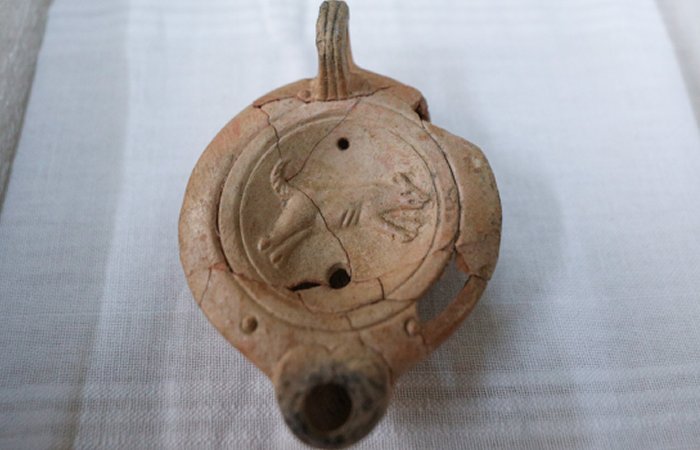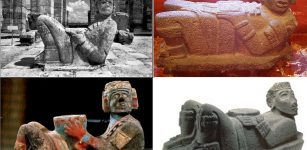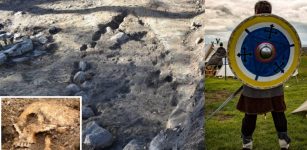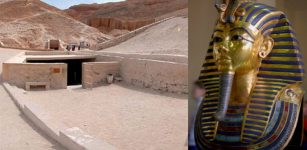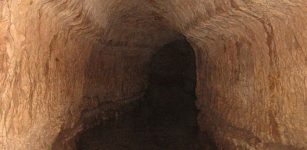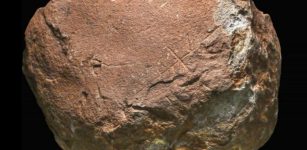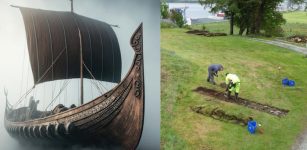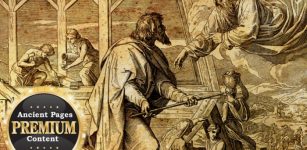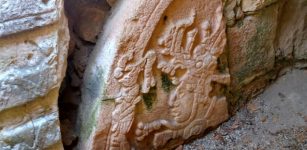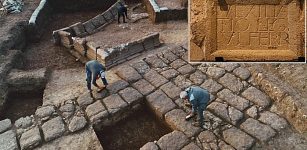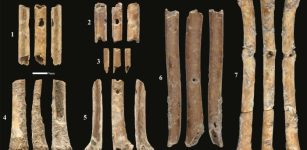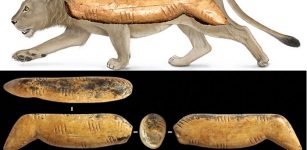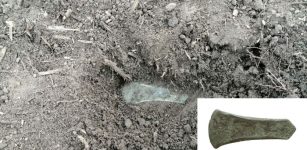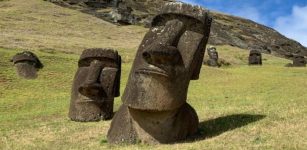Ancient Tomb Of ‘Bird Oracle Markos’ Unearthed In Bergama (Pergamon), Turkey
Conny Waters - AncientPages.com - Recent discoveries in Bergama (Pergamon), the ancient city in West Anatolia are fascinating.
Excavations in the ancient city of Pergamon (Pergamum of Mysia in West Anatolia about 100 km north of Turkey’s Izmir have already revealed many fascinating discoveries in the form of spectacular ruins and artifacts that shed light on the city’s ancient history.
An ampulla discovered in the tomb of Markos, known as "the Bird Oracle of Antiquity," Izmir, Türkiye, Aug. 29, 2022. Image credit: AA
Among the ruins, archaeologists unearthed the Altar of Zeus, and the temples of Athena, Dionysus, and Trajan, and Pergamon library, gymnasiums, Trajaneum theater, an amphitheater, and a huge forum and many other cultural objects of great value.
Pergamon - one of the Seven Churches of Asia, mentioned in the 'Book of Revelation' - was home to about 200,000 inhabitants and played an essential role in the early history of Christianity.
Recently, archaeologists - representing the Bergama Museum and the German Archaeological Institute in the Ancient City of Bergama - discovered the tomb of the priest Markos, who was known as "the Bird Oracle of Antiquity." Markos made divinations from birds' behavior, flight and songs, and used it to make predictions.
Researchers found burial sites called necropolises during the surface studies in the Asclepion area. The inscription on the andesite block found in the necropolis, where treasure hunters were found to have made illegal excavations before, indicates that a grave belongs to "Markos, son of Trophimos", writes Anadolu Agency.
Listed on UNESCO's World Heritage List in 2014, Izmir's Pergamon revealed the tomb of the oracle Markos who was known as "the Bird Oracle of Antiquity," Izmir, Türkiye, Aug. 29, 2022. Image credit: AA
Ít has been determined that Markos, the owner of the tomb, was a "Bird Oracle" priest and lived in the second century AD.
Markos, known as "Augur" focused on prophecy in the Roman world, and interpreted the will of mythological gods by studying the flight of birds, the direction of their flight, the sounds they make while flying, and bird species.
The material of his studies, Markos used to make predictions about the future.
In the tomb of Markos, who is believed to have predicted many issues, including political issues, by watching the flight patterns of birds, grave gifts such as "perfume bottle", "plate", "candle" and the scraping tool "strigilis" used to clean the bodies from oil and sand were also found.
Archaeologist Jakob Krasel from Freiburg University works on a scraping tool called strigilis discovered in the tomb of Markos, known as "the Bird Oracle of Antiquity," Izmir, Türkiye, Aug. 29, 2022. Image credit: AA via Daily Sabah
After the rescue excavation, the tombs thought to belong to the Oracle Markos and his family were covered.
Archaeologist from the German Archaeological Institute Prof. Ulrich Mania told Anadolu Agency (AA) that he had been working in Bergama excavations for a long time and that the latest finds in Asklepion were of great historical importance.
"We came across an illegal excavation site in Asklepion 3 years ago. We found a few ceramic pieces and a few beautiful stones,” Prof. Mania said.
”Two years after the first discovery, we made a rescue excavation with the Pergamon Museum. One of the most important things in the excavation was an inscription on the stone. It was a tomb inscription and the tomb owner's name was given. Markos, son of Trophimos. We already knew the name of Mark. Because perhaps another excavation had found an inscription in which his name was mentioned. There was also an altar near the Asklepion. There was also the inscription Mark. From this inscription, we know that Mark was an Augur (oracle). Markos was a priest and prophesied the future from bird flight.”
Researchers discovered three separate rooms in the tomb building. Markos’ tomb was already destroyed earlier by illegal diggers. However, the other 2 chambers were found in good condition.
"There are many tombs in general and we do not know who they belong to. Maybe we can find bones, maybe ashes, maybe a few burial gifts, but we do not know the status of the owner of the grave. This is important information if it belongs to an oracle, a priest of higher status." said.
Mania stated that they hope to reach important data on both the region and history at the end of the research on the finds they have documented.
See also: More Archaeology News
Archaeologist Jakob Krasel from Freiburg University stated that he has been involved in studies in Bergama for about 4 years and has witnessed researches that are valuable in terms of world history.
Krasel informed that the deepest one in the area where there are 7 tombs belongs to the Oracle Markos, who is considered an important historical personality. Krasel believes that the finds can reveal new information about Markos and his family.
Written by Conny Waters - AncientPages.com Staff Writer

